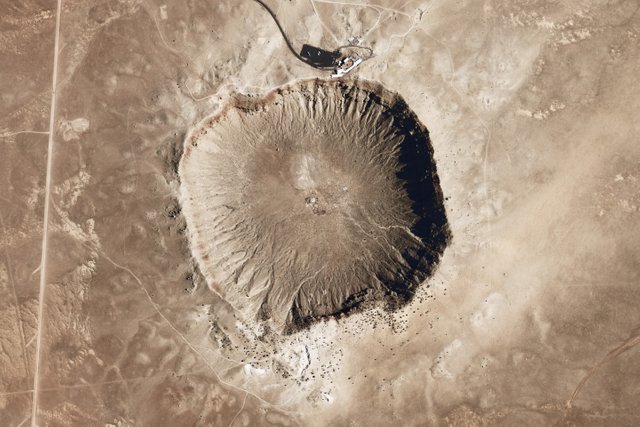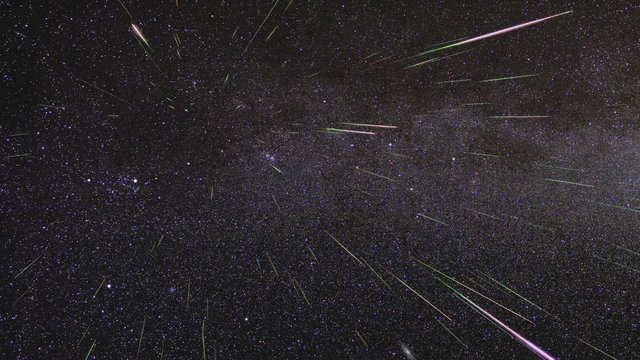Planetary Defense ~ Our Species' Survival Depends on it
If humans want to survive long-term, we need to be paying closer attention to the sky.
We've all heard about the extinction of the dinosaurs, but that was a long time ago. People seem to perceive the threat of asteroids and comets as very abstract and rare, because the only "scary" or devastating story they've heard about occurred a vast 65-66 million years ago. Yeah, that was a long time ago. But asteroids have devastated life on Earth many times since then.
I want to tell you about some more recent asteroid impacts (the list is much longer than this).
*Between 20,000 to 50,000 years ago, a small asteroid about 80 feet in diameter impacted the Earth and formed a crater that measures 1.2 km in diameter. You can take a look at this meteorite crater yourself, it is very well preserved and is located in northern Arizona, U.S.A. Imagine if another "small" asteroid like that hit a populated area in our modern era!

*Between 12,800 and 11,600 years ago it is likely that an enormous amount of humans (and animals living in North America at the time) were killed by a series of cataclysmic impacts, likely due to collisions with debris left behind by a comet.
*Around 7,000 years ago, an inhabited island off the coast of Estonia was devastated by at least 9 meteor fragments. https://www.visitestonia.com/en/kaali-field-of-meteorite-craters
*4,000 years ago an object from space likely created a 2 mile wide crater in southern Iraq.
*Records show that in the year 1490 in Qìngyáng, China there were a large number of deaths caused by a meteor shower. According to Wikipidia, "At least three surviving Chinese historical records describe a shower during which "stones fell like rain", killing more than 10,000 people."
*In 1908, 80 million trees were flattened by a meteor that exploded over Tunguska, Siberia.
*In 2013 there was a blast of 600 kilotons over Chelyabinsk, Russia, many people were injured.
So, who is paying attention to this stuff? Shouldn't we know when this stuff is coming - and where it will hit? Who is keeping an eye on the skies for potentially hazardous objects?
This NASA graphic shared in 2013 shows the orbits of all known potentially hazardous asteroids:

There are a few government programs around the world that monitor for potentially hazardous near Earth objects, but I would like to take time to mention a privately funded organization.
"The B612 Foundation." https://b612foundation.org (I am in no way affiliated with the B612 Foundation, however, I want to share publicly that I support them). The B612 Foundation is a private nonprofit foundation with headquarters in the United States, dedicated to planetary defense against asteroids and other near Earth object impacts. According to CEO Ed Lu, "While most large asteroids with the potential to destroy an entire country or continent have been detected, less than 10,000 of the more than a million dangerous asteroids with the potential to destroy an entire major metropolitan area have been found by all existing space or terrestrially-operated observatories." Take a look at one of their videos if you want to see a visualization of how often meteors impact our planet:
In the meantime, I don't want to bullsh*t you by saying that there is nothing to worry about, and that this threat is non-existent. This is a real threat to humanity, and we truly have no idea when the next big impact will happen. I am not suggesting we panic, but rather, focus on what can be done - let's be proactive.
Let's find out what is out there, and when the next "big one" might reach us.
Let's find out ways to deflect these objects, before it's too late.
I think it would be wise for our species to establish 24/7 monitoring for near Earth objects utilizing multiple space-based infrared telescopes. The B612 Foundation is planning to construct a space-based telescope - The Sentinel - which would help detect more hazardous near Earth objects. Their goal is to have the telescope launched into orbit in the year 2018.
Want to get in touch with your inner astronomer? Get outside and look at the dynamic night sky! The Perseid meteor shower - peaks this weekend - August 12th and 13th, 2016, and this year there it is expected to have an "outburst" of meteors. This means you may be able to see up to 200 meteors per hour! Let's hope they are all tiny fragments that burn up in the atmosphere. Enjoy!
 <-NASA Image from the 2009 Perseid meteor shower.
<-NASA Image from the 2009 Perseid meteor shower.
I panicked until I came to the sentence that suggested I don't panic :D. Check this out: https://www.publicintegrity.org/2013/10/16/13547/new-use-nuclear-weapons-hunting-rogue-asteroids
Bad ass. I am all for using nuclear weapons to protect this planet, if necessary.
Check out Graham Hancock's book, "Magicians of the Gods" if you want to learn more about the clovis comet!